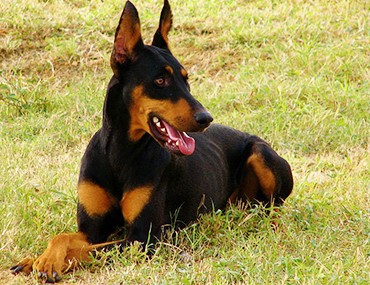Background
Believe it or not, the Doberman was bred to protect a hated tax collector. Now he’s one of the most loving, loyal, and protective pets a family can have.
In 1890, Karl Friedrich Louis Doberman was a tax collector in Apolda, Germany. Unsurprisingly, he wasn’t very popular. But luck was on his side: he owned the local dog pound, where he was able to combine a long list of breeds to create a guard dog to protect him. After combining big, fearsome breeds like the German Pinscher, Rottweiler, Greyhound, Great Dane, Weimeraner, German Shorthaired Pointer, Old German Shepherd Dog, and more, Doberman created his prototype: a dog that was strong, fast, durable, loyal, intelligent, and, when he needed to be, ferocious.
After years of development, the end result was what we know today as the Doberman Pinscher, named after the breed’s creator. Made an official breed in the United States 1908, the Doberman has a long history of military and police service. He served as the official War Dog of the US Marine Corps during World War II as a sentry, messenger, and the breed was made famous for its role in Pacific battles in Okinawa and Guam. The Doberman was also used for search-and-rescue when the World Trade Center towers collapsed in 2001.
Today, the Doberman is used a lot less for military and police service, and he is the 13th most popular dog breed in America. 
Sizing Up
The Doberman is a medium-to-large sized breed, and here are some common physical traits:
- Weight: 60-100 lbs.
- Height: 25-27 inches
- Coat: Short and smooth; light shedder
- Color: Black, red, blue, and fawn
- Lifespan: 10-13 years
What are they like?
Be careful of stereotypes!
Unfortunately, Dobermans have been given a bad reputation as a “bully breed” for a couple of reasons:
- Their history as military and police dogs
- Their size and occasional aggression, especially towards other dogs
- Poor or nonexistent training and irresponsible breeding that encourages this aggression
The Doberman is, first and foremost, smart, loyal, and protective. But he is not sinister or ferocious by nature. Feared by those who don’t know him, the properly trained and socialized Doberman is a gentle, watchful companion.
Highly active both mentally and physically, the Doberman is a born athlete and loves to play. He can be a great companion for an active person or family. In spite of his size – the Doberman is a thick, muscular dog – he can be great around children as well as guests from outside the home. The big thing with the Doberman is training. Luckily, the Doberman is highly trainable.
When it comes to health, there are some hereditary problems in Dobermans that you should know about:
- Dilated Cardiomyopathy, which causes an enlarged heart, is a major problem. Annual heart exams are highly recommended.
- Von Willebrand’s Disease
- Hypothyroidism
- Hip dysplasia
- Wobbler's syndrome
Right for you?
As with any new pet, there are some considerations to make before you welcome a Doberman into your family:
- We can’t emphasize the importance of training and socialization enough. When it comes to a Doberman, training should start early and you should be very dedicated and persistent. However, it’s important to realize that you aren’t reforming a Doberman from being vicious, just preventing him from developing bad habits.
- The Doberman is big, strong, and highly-energetic. It should be understood that the Doberman is not for everyone. In general, he needs an owner that is both strong enough to handle him and confident enough to take charge.
- The Doberman needs a lot of exercise. Our mantra is “a tired dog is a good dog.” An hour each day at minimum is best for a Doberman, as it will keep him healthy and out of trouble.
- Social stigmas. Owning a Doberman isn’t for the thin-skinned. No matter how loving or gentle a Doberman is, there will always be people who look at him as a mean, vicious creature. You’ll have to be prepared for breed discrimination, including breed-specific laws, as the parent to a Doberman.
When trained well and exercised thoroughly, the Doberman can be a great companion for the right person or family.
If you have any questions or concerns, you should always visit or call your veterinarian – they are your best resource to ensure the health and well-being of your pets.
